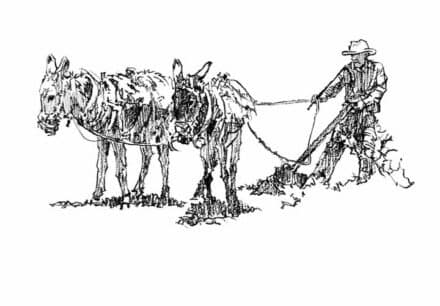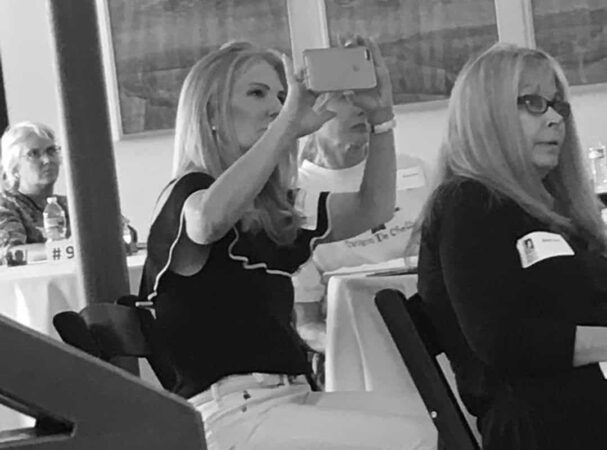I‘ve been watching the news—bad idea, I know. Senator Joe Manchin was explaining how his bipartisan congressional group had been working night and day to get a “skinny” stimulus bill passed. “We’re doing the work,” he said, “my other colleagues need to understand that you have to just show up and do the work.” He’s right, of course, and it now looks like an emergency bill may actually pass before support runs out at the end of this terrible year. The irony is overwhelming, though: a skinny bill for increasingly skinny people? Congress finally working because no one else can?
Clark Hulings’ 42 Hour Per Week Rule

To feel he had done his job in any given week my father had to work at least 42 hours in any configuration. So, he would work all seven days for six hours each day, or six days for seven hours each day. If other activities invaded and threw him off one day, he would work twelve hours the next day to make up for it. He was incredibly disciplined. That said, his work week was not 9:00-5:00. He would often go to bed really early, and then get up around midnight or 1:00 AM and work for several hours. As a teenager I would often be getting ready to go out as he was getting ready for bed, and he’d be working when I got home. This was a problem for me when I missed curfew!
My father’s definition of work included anything relevant to the success of his art business: painting, preparing or stretching canvas, taking collectors to dinner, keeping up his sales and inventory logs, correspondence, shopping for materials, surfing through his extensive source material to decide what to work on next, listening to Rachmaninov or Eurythmics or whatever struck the right chord, pouring over the work of other artists he admired, etc. He would ruminate about different compositional elements he might combine. Sometimes he would take many days feeling his way toward his next project. Other times he would be so excited about the next thing that he would have to push himself to finish what was in front of him. Regardless, he always showed up for himself and did the work. One thing I always admired about my father was how honest he was able to be with himself about when he was working, and when he wasn’t. I aspire every day to have the courage and discipline to level with myself about what counts as work for me. It’s not cut and dried. Since I work on strategy, sometimes staring at a wall or taking a walk is absolutely the most productive thing I can do. Other times I do those things to avoid the real work. I’m not telling you anything new—we all experience this.
There are days when you wake up in the zone, ready to be productive at whatever lies in front of you. And there are other days when you wake up in a different zone, and getting anything done is a little more challenging. Unlike the US Congress, few of us have the option of not accomplishing anything. Most of us reap what we sow. If lions don’t hunt they don’t eat. Most of the creatures on this planet don’t even break their lives down into work and non-work. It’s more holistic.
What Work Counts As Work?

I manage the estate of an artist who spent decades documenting and celebrating the work of everyday people, and I run a nonprofit organization that helps creative professionals build their businesses and careers. In the US, we have a very narrow definition of work, and a strict hierarchy of value for some activities over others, which I don’t believe serves us very well. I know you think I’m now going to talk about teachers versus lawyers, but I am actually thinking about how we engage our brains, not about our professions. For many years now my own motto has been Dream-Build-Deliver. All three activities are essential in any successful undertaking, but the second two are wrongly praised more than the first. This is also ironic, since nothing is possible until someone has dreamt it, and the spaces in between the three are where progress happens.
I had a conversation recently with amazing watercolorist and CHF Fellow, Tim Saternow, about “doing the work” of artistic process. In business terms we call this product design and product development, but it really happens before either of those activities, and also during them. It’s the birth of an idea and the nurturing of that idea until it becomes substantial enough to enable design and development. First you have to Dream, then you can Build and then, finally, you can pack the creation in dry ice and Deliver it to the hospital to be shot into people’s arms. Every stage requires “doing the work,” and each kind of work is equally important. In our lives the trick is to balance out those different activities, and give ourselves space to flow within them. That’s the part we’re not so good at valuing. “Mindfulness” is something many people actively pursue these days. I applaud this wholeheartedly, but not if its pursuit is in lieu of mental wandering and dreaming.
The Dignity of Work
I always think a lot about work, but never more so than right now, as office workers work from home, unemployment has skyrocketed, and many are being forced to acknowledge that “blue collar,” “minimum wage,” and “essential” are synonyms. Turns out I am talking about teachers versus lawyers, or maybe even package handlers versus pundits.
My father celebrated work and workers—that is who he was, and what his art conveys. He admired everyone who shows up and does whatever their work is. So as I look back over 2020 and look forward to a healthier, easier 2021, I hope we can all use this time to remember what our real work is, and dream productively about how to show up and accomplish whatever that is once we can all get back to work. Meanwhile, I want to thank everyone out there who’s been showing up for each other and doing what needs to be done, whether that means putting your life on the line or staying home alone.







